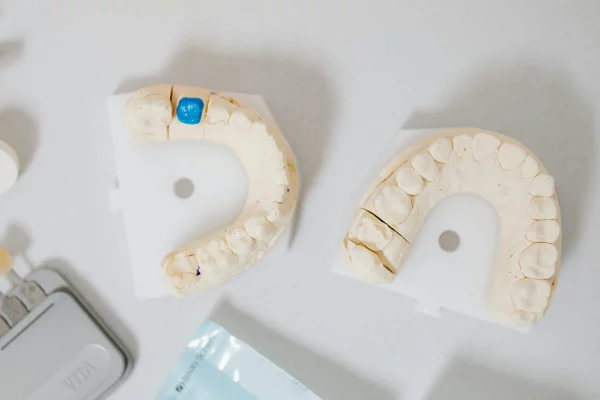When teeth become weakened or damaged, dental crowns offer a proven solution to restore both function and appearance. Whether from decay, trauma, or extensive dental work, a compromised tooth often needs reinforcement beyond what a filling can provide. That’s where crowns step in—serving as protective covers that help save natural teeth while giving you a strong, attractive smile.
At G&P Dental, we recognize how important your oral health is to your confidence, comfort, and quality of life. Let’s take a closer look at how dental crowns work, when they’re necessary, how long they last, and why choosing the right provider makes all the difference.
What Are Dental Crowns and How Does It Work?
A dental crowns are essentially a cap that fully encases a damaged or weakened tooth. It’s custom-designed to match your natural tooth in shape, size, and color while restoring its full function. Once placed, a crown strengthens the tooth, allowing you to chew, speak, and smile without concern.
Different Types of Crowns: Porcelain, Metal, and More
Dental crowns are constructed from a range of materials, each offering unique benefits tailored to specific clinical needs. Porcelain and ceramic crowns are notably favored for their ability to closely replicate the appearance and translucency of natural enamel, making them especially suitable for anterior teeth where esthetics are paramount. Porcelain-fused-to-metal (PFM) crowns provide a combination of the structural durability of metal with the pleasing appearance of porcelain, and are frequently utilized in both anterior and posterior regions.
Metallic crowns, including gold alloys, are exceptionally resilient and long-lasting, though their conspicuousness generally restricts their use to posterior teeth where function outweighs cosmetic considerations. Zirconia crowns represent a more contemporary option, delivering an effective compromise between strength and esthetic appeal, with enhanced resistance to chipping and wear. Ultimately, the selection of crown material involves a collaborative process between clinician and patient, considering factors such as tooth location, occlusal demands, and individual cosmetic preferences.
The Role of Dental Crowns in Restoring Damaged Teeth
Crowns play a crucial role in dental health and restoration. They provide essential protection for teeth that are cracked, weakened, or otherwise compromised, acting as a durable covering that can prevent further harm. In cases where a tooth is significantly worn down or fractured, crowns help restore both function and form. They are also critical for supporting teeth with large fillings, particularly when the remaining tooth structure is not robust enough on its own.
From an aesthetic standpoint, crowns address issues of discoloration or irregular shape, helping to create a more uniform and natural-looking smile. Beyond this, crowns serve as coverings for dental implants and as anchor points for dental bridges, ensuring long-term stability and proper dental function. By fully encasing a tooth, crowns maintain its integrity and often eliminate the need for extraction, allowing patients to preserve their natural dentition whenever possible.
When Are Dental Crowns Necessary?
Not every dental issue necessitates the placement of a crown. Yet, when a tooth is significantly compromised—whether by advanced decay, deteriorating or oversized fillings, fractures, or following root canal therapy—a crown often emerges as the most effective method for restoring structural integrity and function. In such scenarios, a crown encases the remaining tooth structure, offering durable protection and stability. This approach helps maintain essential oral functions such as chewing and speaking, while also supporting the tooth’s appearance and longevity.
For Broken, Chipped, or Severely Decayed Teeth
- Large Cavities: When decay has destroyed much of the tooth, fillings may no longer provide enough support.
- Fractured Teeth: Crowns protect cracked or broken teeth from splitting further.
- Chipped Front Teeth: In some cases, severe chips may warrant a crown to restore appearance and function.
Without timely intervention, these problems can escalate, leading to pain, infection, or tooth loss.
After Root Canal Treatment: Why Crowns Are Often Required
Following a root canal, the tooth’s structure can become brittle due to loss of blood supply. Placing a crown provides:
- Strength and stability
- Protection against fractures
- A sealed surface to prevent reinfection
Crowns help ensure root canal-treated teeth last for many years.
How Long Do Dental Crowns Last?
Dental crowns are built to endure for a significant period, frequently lasting ten to fifteen years, and in some instances, even longer with appropriate care. Their longevity depends on several factors, such as the type of material chosen, the patient’s oral hygiene practices, the condition of the tooth beneath the crown, and behaviors like bruxism (teeth grinding). Consistent dental checkups and professional cleanings, combined with diligent at-home maintenance, can help maximize the lifespan of a crown and ensure its ongoing effectiveness in protecting the underlying tooth.
Factors That Affect the Longevity of Your Crown
The longevity of a dental crown depends on a variety of factors. Material choice is especially important—crowns made from gold or zirconia often demonstrate greater durability and extended lifespan compared to those constructed from porcelain. Adhering to rigorous oral hygiene practices, such as daily brushing, flossing, and regular professional dental cleanings, is essential in reducing the risk of secondary decay or periodontal complications adjacent to the crown.
Additionally, occlusal factors play a significant role. Individuals who habitually grind or clench their teeth place increased mechanical stress on their dental restorations, which can contribute to premature crown failure. Dietary habits are also influential; avoiding particularly sticky or hard foods minimizes the risk of chipping, cracking, or dislodgement of the crown. The anatomical location of the crown matters as well—restorations placed on posterior teeth are subjected to greater masticatory forces and, as a result, may experience accelerated wear compared to those on anterior teeth. Overall, while no dental crown is permanent, careful material selection, diligent oral care, and mindful habits can substantially extend the functional lifespan of these restorations.
How to Care for Crowns to Extend Their Lifespan
Maintaining the longevity of a dental crown primarily depends on diligent oral hygiene and preventive care. Brushing twice daily with a non-abrasive toothpaste is recommended to safeguard both the crown and adjacent teeth from wear or damage. Regular flossing is crucial as well, as it prevents plaque accumulation around the crown’s margins.
For individuals prone to bruxism (teeth grinding), the use of a custom-fitted nightguard is advisable to minimize undue pressure and potential fracturing of the restoration. Routine dental examinations are essential, allowing the clinician to monitor the integrity of the crown and address emerging concerns before they escalate. With consistent adherence to these measures, dental crowns commonly remain functional for 10 to 15 years, and in some cases, even longer.
Why Choose GP Dental for Your Crown Procedure?
Precision is paramount in restorative dentistry. At G&P Dental, we integrate advanced clinical expertise with cutting-edge technology and a patient-focused philosophy. Our dental crowns are meticulously crafted to harmonize with your natural teeth—functionally and aesthetically. Each crown is individually designed to replicate your bite, match your tooth color, and reflect your unique dental anatomy, supporting both durability and a lifelike appearance. This rigorous attention to detail enables us to restore your smile with assurance, providing both structural integrity and visual satisfaction.
High-Quality Materials and Expert Craftsmanship
At G&P Dental, we are committed to utilizing only premium, rigorously vetted materials in the fabrication of custom crowns. Quality and performance are paramount; we do not compromise in these areas. Our process is precise, with careful attention paid to fit and bite alignment to ensure patient comfort and functional integrity. Color matching is also a priority, allowing each crown to blend seamlessly with adjacent teeth for an aesthetically pleasing result.
We collaborate exclusively with highly reputable dental laboratories recognized for their technical excellence. This partnership supports the production of crowns that are not only durable but also harmonious in appearance. Through these measures, we strive to preserve both the health and beauty of our patients’ smiles over the long term.
Comfortable, Efficient Treatment and Personalized Care
At G&P Dental, patient comfort is a clear priority throughout the entire process—from the initial consultation to the final crown placement. Transparency is central to our approach: we communicate each stage in straightforward terms to ensure patients are well-informed. Our preparation methods are deliberately gentle, with a focus on preserving as much of the natural tooth structure as possible. This not only minimizes discomfort but also supports long-term oral health. For select cases, we offer same-day crown procedures to maximize convenience. Post-placement, we maintain diligent follow-up care to monitor the crown and support ongoing oral wellness. Ultimately, G&P Dental aims to provide not just a dental crown, but a personalized experience centered on the patient’s continued well-being.
Frequently Asked Questions (FAQs)
1. How long do dental crowns typically last?
With proper care, most dental crowns last 10 to 15 years, and some even longer. Factors like material choice, daily hygiene, and bite habits can influence longevity. Regular dental visits allow your dentist to monitor the crown’s condition and address minor issues before they become significant.
2. Are dental crowns procedure painful?
Most patients experience little to no discomfort during the crown procedure. Local anesthesia numbs the area while your tooth is prepared. Some people may feel mild sensitivity afterward, especially when chewing or drinking hot or cold liquids, but this typically resolves quickly.
3. Do dental crowns look natural?
Yes. Modern crowns are designed to closely resemble natural teeth in both color and shape. Porcelain and zirconia crowns, in particular, offer excellent aesthetics, making them virtually indistinguishable from your surrounding teeth. Your dentist will carefully match your crown to your existing smile.
4. Can dental crowns be placed on dental implants?
Absolutely. In fact, crowns are often used to complete dental implant restorations. Once the implant post integrates with the jawbone, a custom crown is attached, providing a fully functional and natural-looking replacement tooth.
5. Are dental crowns covered by insurance?
Many dental insurance plans cover a portion of the crown procedure, especially if it’s medically necessary to restore function or protect a damaged tooth. However, coverage varies depending on your plan, deductible, and annual maximum. Our office team at G&P Dental can help you review your benefits and financing options.
Take the First Step Toward a Stronger, Healthier Smile. If you’ve been told you may need a dental crown—or suspect one could help—it’s essential to act before further damage occurs. The sooner you address weakened teeth, the more options you’ll have for preserving your natural smile. Don’t wait for minor damage to turn into a serious problem. Schedule your consultation at G&P Dental today and discover how dental crowns can restore your confidence, comfort, and oral health for years to come.


